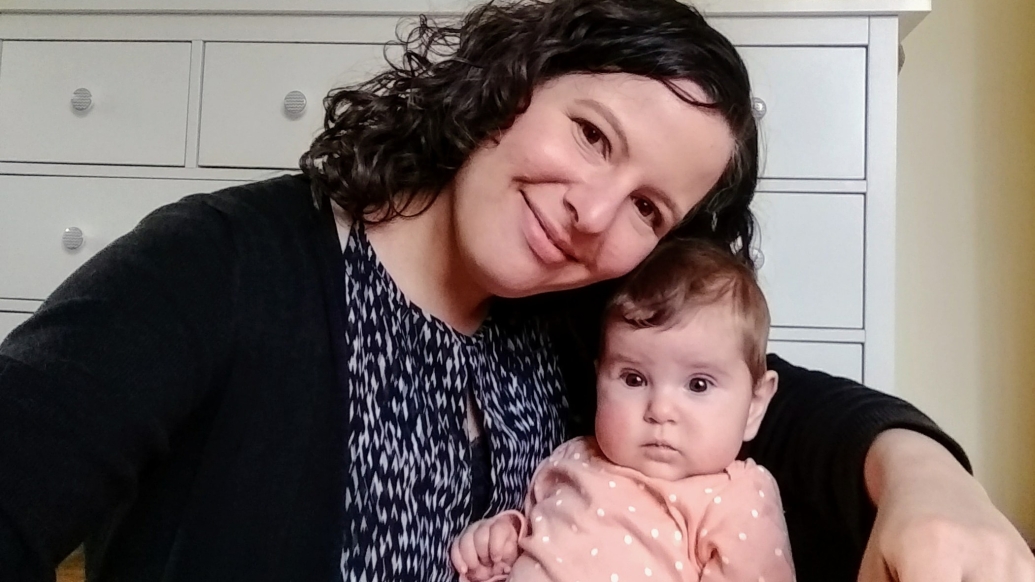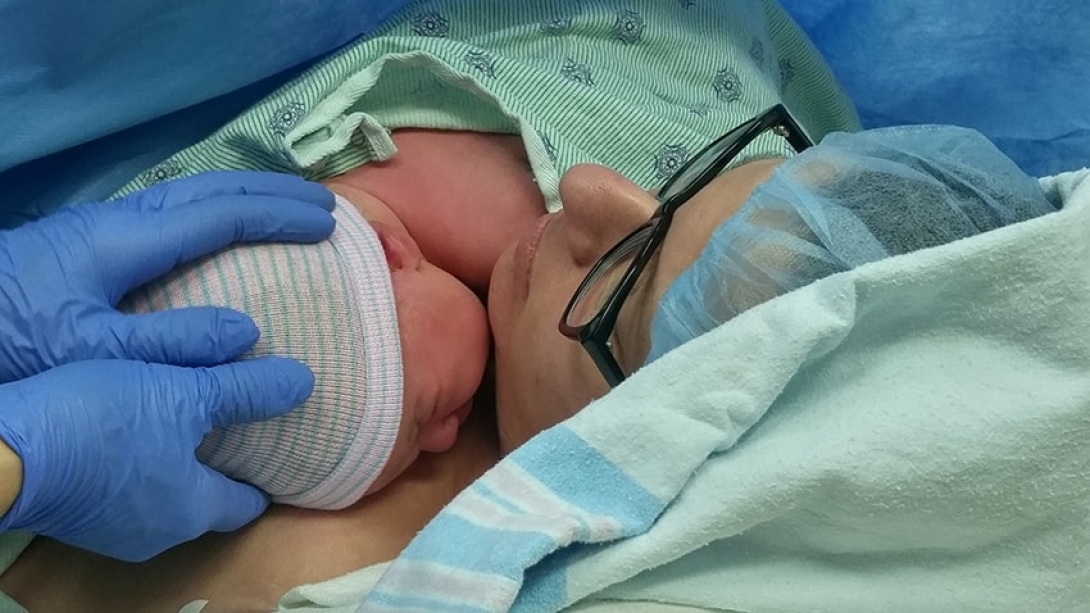Mother’s Day can be fraught with emotion for couples experiencing infertility — a struggle this Michigan couple knows too well. Luckily, their story has a happy ending.
7:00 AM
Author |

Leah Warshaw has been soaking up all of the "firsts" with her brown-eyed, curly-haired, 4-month-old daughter, Evelyn, known as "Evie."
MORE FROM MICHIGAN: Sign up for our weekly newsletter
Those first big grins when meeting new people. Late-night cuddles. That first real baby laugh while Mom or Dad plays peekaboo.
And this weekend brings a big first for Warshaw herself: her first Mother's Day.
"It's amazing how this tiny person who didn't even exist four months ago has turned me into a mother, and it feels so normal and right," she says. "It's the most earth-changing thing that has ever happened to me."
But getting here didn't go the way she'd pictured.
Warshaw spent months meticulously following fertility kits and administering self-injected medications to help her body conceive a child.
"The hardest part is the uncertainty," Warshaw recalls. "Each cycle you're feeling cautiously hopeful thinking this might be the time you get pregnant, and you get excited to take the test to find out. It's this big buildup, but yet another letdown."
Each passing month heightened such emotions.
"It gets scarier because you start thinking, 'Is this one more step to getting pregnant or one more step toward finding out I'll never have children?'" Warshaw says. "When you're in the middle of it, you don't know if that feeling is going to last forever or if you're going to get a happy ending."
Seeking fertility treatments
Warshaw and her husband, Wayne Woodward, of Ypsilanti, Michigan, were together for nearly six years and married for two before trying to start a family, waiting until Warshaw completed her master's degree. By then, she was 34, and he was 39.
SEE ALSO: 5 Strategies to Stop Infertility from Stressing Your Relationship
After half a year of trying to conceive naturally, they turned to the University of Michigan's Center for Reproductive Medicine. Warshaw spent several months using Clomid, a medication that stimulates extra follicles in the ovaries to help induce ovulation.
When pregnancy still didn't occur, the couple opted for in vitro fertilization.
"We put all of our eggs in one basket, so to speak," Warshaw says.
The first step in IVF is ovulation induction to help a woman's body develop multiple mature eggs for fertilization instead of just one. In Warshaw's case, the induction led to 15 eggs.
Of those eggs, 13 were able to mature fully, 11 of which could get fertilized. Only four would make it past five days.
"It just starts whittling down, and you realize there are all these points of potential failure," Warshaw says. "When you're doing IVF, there's this transition from trying every month with a lot of ups and downs to this new nervousness about everything hinging on this one thing going right."
She attended an infertility support group to connect with other women throughout the process — a step that social workers and doctors at Michigan recommend to all couples receiving fertility treatment.
Then, last spring, the couple got the message they had been waiting for: Warshaw was finally pregnant.
It took several more months for it to feel real, as her belly began to grow and an ultrasound showed a baby girl growing a tiny heart, fingers and toes.
"It took so much to get there that it was hard to be in that moment completely," Warshaw says. "Instead of this one profound, celebratory moment, it slowly dawned on me that I was actually pregnant. That this was really happening."

Adjusting to a new role
Evie arrived right before Christmas — on Dec. 19. She was born 8 pounds, 12 ounces, delivered by the Von Voigtlander Women's Hospital's Nurse-Midwifery team.
The couple were elated to meet their baby girl, but postpartum depression soon clouded the initial mother-daughter bond.
"Those first few weeks were so hard," Warshaw says. "I thought something was wrong with me because we had worked so hard to have her and I couldn't understand why this didn't feel right. Evie could not have been more wanted."
She shared her emotions with health care providers.
"I was very honest with my midwife about what was going on, and she told me this was not something women should have to suffer in silence," Warshaw says. "Once I was able to get treatment for it and manage it, I gradually felt what everyone told me being a mom would be like. I was ecstatic.
SEE ALSO: An 'Outrageous' Idea That's Saved Thousands of Babies
"Now that I've gotten used to my role as a mother, I'm surprised by how natural it feels. I can't imagine her not being here. I'm completely in love with her."
These days, the new parents enjoy downtime as a family, cuddling and making faces with little Evie and watching her experience all those newborn milestones.
"When there was a chance we couldn't have kids, I did a lot of soul-searching about why I wanted a child in the first place," Warshaw says. "People find meaning in their lives in different ways. For me, when I think about what makes life meaningful, it's my relationships. Raising a child is the ultimate lifelong relationship.
"Every experience with her is new," she adds. "I'm just so happy to have this experience because I wasn't sure I ever would. I'm really looking forward to the future and more things we get to experience together and just getting to know her as a person."
And Mother's Day is twice as special a celebration this year as Warshaw's mother, who recently experienced a recurrence of non-Hodgkin lymphoma, is traveling from North Carolina to spend the weekend with the family.
"For me, there are so many big parts of what Mother's Day represents," Warshaw says. "First, I have Evie. I wasn't sure I'd ever have her. And second, I didn't know whether my mom would get to meet her.
"This Mother's Day, I have my mom and I have my daughter, and that means so much."

Explore a variety of healthcare news & stories by visiting the Health Lab home page for more articles.

Department of Communication at Michigan Medicine
Want top health & research news weekly? Sign up for Health Lab’s newsletters today!





